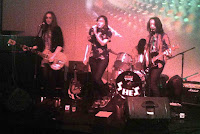"I’d venture to say that almost all bands start by playing cover songs. After all, what better way to get your chops together than by emulating something already tried and true - i.e. a hit song.
The problem comes when a band or artist begins to gain some popularity as a result of playing cover songs, yet has aspirations of one day playing their own music. Unless you’re extremely clever right out of the box, chances are that your self-composed material doesn’t get the crowds going the way the cover material does. This means that as soon as you begin to play one of your own, that hot enthusiastic crowd suddenly goes ice cold, making you feel like your song just isn't cutting it.
Before you begin to think that way, remember that it’s not your fault that your material doesn’t get the same kind of response. A hit record has usually been finely crafted by a slew of experts, and it’s been burned into your audience’s consciousness over a long period of time. How can you compete with that? Chances are that through no fault of your own, you weren’t able to put nearly that same kind of time or effort into your material, and of course, it's all new to your audience.
So how do you make the transition from cover artist to playing your own material? Try these four steps.
1. Take what you think is your best song and work it up show-wise so it’s the best song in your set. This means that you concentrate on the dynamics of the song, the lighting, and the movement of the players on stage. Don't know what I mean? Watch a concert by your favorite band or artist. At some point during the set (or several times even) the show will peak thanks to something that goes beyond just standing there and singing and playing. That's what you want to do. I realize that it isn’t as easy as it sounds, but this is a step you’ve got to take.
2. Connect that song to one of the hot cover songs that you do that's similar in theme and/or tempo, then play them together in a medley. Keep working on it until your song get's the same response as the cover because it probably won't happen the first night that you play it. Don't get discouraged, these things take time to perfect for every artist or band, even the hit makers.
3. After you’ve gotten your audience used to one of your songs, use the same technique to put a second, then a third song into your show. It's a gradual process, so just be sure that both your songs and the show around them are as well-crafted as you can get them. It's quality you're going for, not quantity.
4. Finally, since you have to still play cover songs for the time being, don’t play them exactly like the record. Don’t be afraid to give them your sound. Remember that you're audience is digging more on the familiarity of the song rather than how close to the record your performance is.
Remember that the above steps won’t work if you can’t write a song to save your life, your arranging ability is hopeless, or you don’t put the requisite work into the show. But if you do, this can be a way that you can gradually transition out of being just a “cover band.”
By the way, at all costs, don’t call your songs “originals.” This one word signals amateur and labels the song as inferior in the audience’s mind. Instead, use “my (or our) music” or “my (or our) songs,” or better yet, don’t even identify it. If it’s any good, people will find out soon enough who wrote it."
If you want more band tips, check out How To Make Your Band Sound Great, or read a few excerpts at bobbyowsinski.com.
----------------------------------
You should follow me on Twitter for daily news and updates on production and the music business.
Don't forget to check out my Music 3.0 blog for tips and tricks on navigating social media and the new music business.



3 comments:
I think everyone starts with cover versions in one way or another, great tips to transition to your own tunes.
Well put Bobby, thanks.
Some of history's greatest bands not only started out playing and even releasing records with a majority of covers (Beatles, Stones...) but still incorporated covers into their live acts as well like The Who, Led Zeppelin and Queen, for example.
Learning and performing covers you love (and the audience also loves) can be just as difficult and rewarding to play as one's own material. You can only become a better musician for developing both these abilities and capacities to entertain.
It's educational in many ways and opens one's musical mind to more genre's and possibilities than relying on a one-sided view to performing only one style with its inherent limitations.
Hey, 'Life is like a box of chocolates. You never know what you're gonna' get.'
Good songwriting does start with imitation. This can be helpful for any artist wanting to move from covers to originals. Audiences do enjoy hearing familiar songs. Cover being familiar can help in building a fan base. As the fan base grows, original material can then be incorporated into a music artist set.
Post a Comment